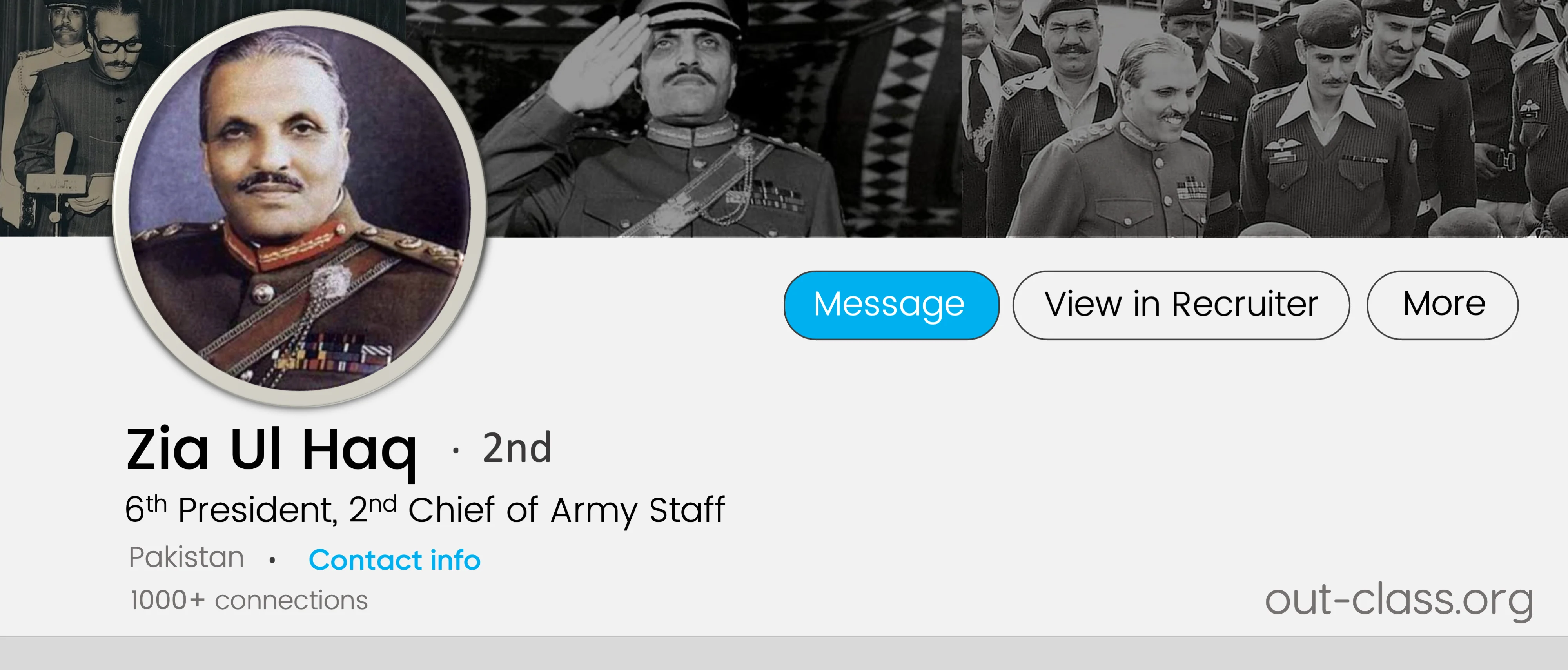If you’re a student of IGCSE & O Level Pakistan Studies then General Zia-ul-Haq's era stands out as a pivotal chapter marked by a steadfast commitment to Islamization across legal, social, economic, and political spheres. Zia-ul-Haq, the sixth President of Pakistan who administered martial law, envisioned aligning the nation with Islamic principles and introducing policies that left an indelible mark on the country.
What are the Policies of General Zia Ul Haq?
Islamization Policy of Zia ul Haq:
A common question in the IGCSE & O Level Pakistan Studies exams is, ‘Why did Zia-ul-haq introduce his Islamisation reforms’. Here are the points that answer this question:
-
To legitimize and strengthen his rule after coming to power through a military coup in 1977.
-
To create social stability by promoting Islamic principles as a cohesive framework for Pakistan's diverse population.
-
To gain support for the resistance against Soviet forces in neighbouring Afghanistan during the Cold War.
-
To gain popularity among certain segments of the population, especially conservative and religious groups.
-
To consolidate his political power and suppress dissent charged by secular and leftist opposition.
Zia's administration pioneered several Islamization programs, encompassing economic, educational, and legal reforms. The Zakat and Ushr Ordinance instituted in 1980, aimed to Islamize the economic system, advocating a "Profit and Loss Sharing System" in banking. The establishment of a Federal Shariah Court reinforced adherence to Quranic teachings in legal matters, with stringent penalties for blasphemy against the Holy Prophet.
Zia Ul Haq was aware that Pakistan needed a well-organized and stable government. One of his measures to provide a strong government was the introduction of the Hudood Ordinances. Hudood Ordinances were intended to implement Shari'a law or bring Pakistani law into "conformity with the injunctions of Islam", by enforcing punishments mentioned in the Quran and sunnah for Zina (extramarital sex), qazf (false accusation of zina), theft, and consumption of alcohol.
Education Policies:
Education underwent a significant transformation with compulsory courses in Islamic Studies and Arabic and extra marks for Hafiz-e-Quran individuals in professional studies. Zia even elevated religious teachers in the armed forces to Commissioned Officer status, attracting qualified individuals from educational and religious institutions.
Economic Policies:
Zia-Ul-Haq's domestic policies navigated industries' denationalization, welcoming foreign investments and fostering economic growth. His commitment to economic success materialized in completed projects like the Steel Mill and Karakorum Highway.
Foreign Policy:
Internationally, Zia's successful foreign policy was evident in Pakistan's memberships, especially in the Non-Aligned Movement (NAM) and support for Afghan mujahidin.
Zia's pivotal role in the Afghan War against the Soviet Union showcased his strategic insight. Negotiations led to the Geneva Accord in 1988, securing the withdrawal of Soviet forces in two instalments. However, this victory came at a substantial cost, as Pakistan grappled with the responsibility of hosting over three million Afghan refugees, leading to economic burdens and societal challenges.
Conclusion:
In retrospect, students of History must be well-versed in the enduring legacy of General Zia-ul-Haq's policies, shaping Pakistan's socio-economic and political landscape. While his era witnessed both triumphs and challenges, the imprint of his vision for an Islamized Pakistan remains etched in the nation's history. At the same time, the imposition of Martial Law created fissures in Pakistan’s democratic foundation.
Most Common Repeated Questions:
Unlock the secrets to acing your CAIE IGCSE & O Level exams with a sneak peek into the most frequently asked questions that have graced the pages of past papers!
- In which of the following did Zia-ul-Haq have the most success between 1977 and 1988: (i) Islamization; (ii) economic affairs; (iii) political affairs? Explain your answer regarding all three of the above. (14) [May/June 2003, 2012]
- ‘Islamic reforms were the most important of Zia-ul-Haq’s domestic policies between 1977 and 1988.’ Do you agree? Give reasons for your answer. (14) [Oct/Nov 2005, 2014, 2021] [May/June 2010]
- Why did Zia ul-Haq introduce his Islamic reforms between 1977 and 1988? (7) [May/June 2006, 2008, 2011, 2018, 2023]
- ‘Zia-ul-Haq’s foreign policy was more successful than his domestic reforms’. Do you agree or disagree? Give reasons for your answer. (14) [May/June 2007, 2018]
- Zia Ul Haq was aware that Pakistan needed a well-organized and stable government. One of his measures to provide a strong government was the introduction of the Hudood Ordinances. What were the Hudood Ordinances? (4) [Specimen, Oct/Nov 2013]
- What difficulties did Zia-ul-Haq find in ruling Pakistan during the late 1980s? (7) [May/June 2013, 2016][Oct/Nov 2020]
- What was the ‘Afghan Miracle’? (4) [May/June 2015]
FAQs:
Q. Who did Zia-ul-Haq overthrow?
General Zia Ul Haq, the then-army chief of staff, overthrew the government of Prime Minister Zulfiqar Ali Bhutto through a bloodless military coup on 5th July 1977. (The 2nd military coup to take place in Pakistan)
Q. Who imposed 1st martial law in Pakistan?
President Iskandar Mirza was the first to declare martial law in Pakistan. He dismissed the government of Sir Feroz Khan Noon and dissolved the National Assembly of Pakistan and the provincial legislatures.
Q. Who was the president of Pakistan after Zia?
General Zia Ul Haq left the office in August 1988 after he passed away. Thus, under the law of succession, the position of acting-President was left to Ghulam Ishaq Khan, a long-time civil servant and chairman of the Senate.


